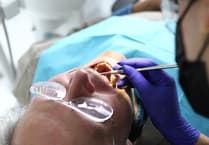This winter’s storms have taken their toll on the seal pups born around our island shorelines and we have received a much higher number of calls about ’stranded’ pups than normal.
Sadly, Manx Wildlife Trust has logged and recorded many more dead seal pup bodies than it would do in an average year.
Many of the seal pups that appeared stranded were, in fact, simply resting and they swam back into the sea on the next tide.
However, some have needed our help and so far this winter we have brought four seals to Ard Jerkyll for veterinary treatment.
One young male died of a respiratory infection just a couple of days after arriving, despite being given anti-biotics, but the other three have thrived.
Rose was only a few days old when she arrived in October, and she had a badly-infected wound on one of her flippers that meant that two digits had to be removed.
She was fed ’fish soup’ for several weeks before being weaned onto whole fish, but she was a reluctant feeder.
The ManxSPCA’s seal facility is limited and it became apparent that Rose needed to be able to mature in a larger enclosure surrounded by other seals, so that she could learn to swim and hunt.
In November Rose was transported in a ManxSPCA ambulance, accompanied by two members of staff, to a wildlife centre in Ayrshire.
She travelled well, and tucked into an afternoon snack of mackerel as soon as she arrived in her new home.
Her prognosis is excellent - if she learns to swim and use her injured flipper properly, and she can fend for herself, she will be released back into the wild. If she is compromised in any way, she will spend the rest of her days at the centre which has large sea water pools and specialist facilities.
Towards the end of last year we brought in two more pups that were clearly in distress - one was called Kirk and the other Douglas, and so you can guess where they were found. Both the pups had already developed their darker ’adolescent’ coats and were able to eat fish for themselves, but they were both very underweight and had breathing problems.
They spent several weeks in our indoor seal pens, putting on weight and regaining their health. Last week they were moved to a much larger outdoor pen so that they could acclimatise to colder conditions and develop their muscle strength.
They are heavier than they need to be so that they can burn off some body fat without it having a detrimental effect, and they are due to be released back into the sea in the next few days.
It has been a privilege to observe these wonderful creatures at close quarters, but we have tried hard not to get them too used to human company.
It is important that they retain their ’flight or fight’ instincts in order to survive in the wild.
This is why a beached seal should never be approached - they can be very ferocious and give a nasty bite to an inquisitive dog or human.
Nasty bites are the last thing that Holly and Molly give their human friends - this lovely pair are now officially our longest stay residents in the cattery, having been with us since September, but we don’t know why because they are the most gentle and laid back cats one could possibly meet. Holly is a stunning 13-year-old tortoiseshell, and Molly is an 11-year-old jet black colour, and although they are both a little on the plump side they are in excellent health. They spend most of their time in a socialisation room, but they dart straight out of the door when it’s opened so that they can mooch around the cattery, inspecting the laundry room, the kitchen and the office to check everything is in order.
They need a home to call their own, though, so that they can settle down and relax in familiar surroundings and in their own territory. Please come and meet them and see at first-hand what lovely cats they are - you won’t be disappointed.


.jpeg?width=209&height=140&crop=209:145,smart&quality=75)


Comments
This article has no comments yet. Be the first to leave a comment.